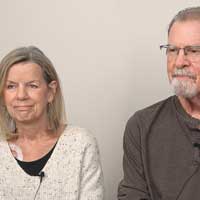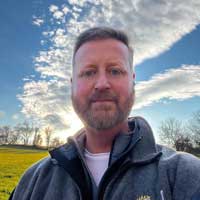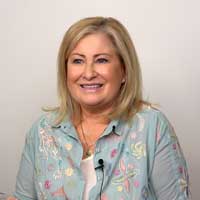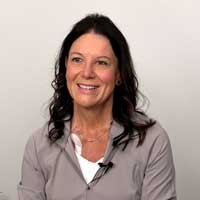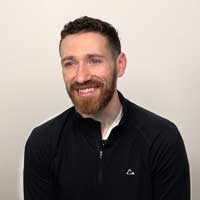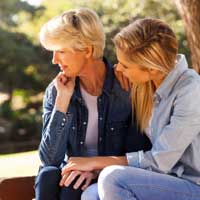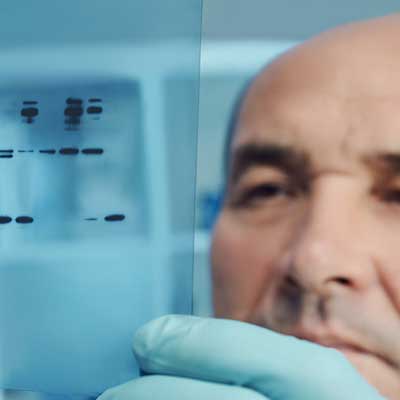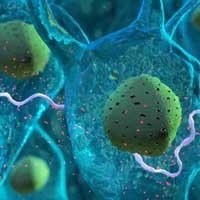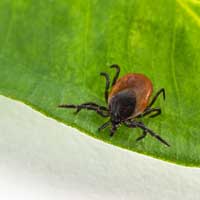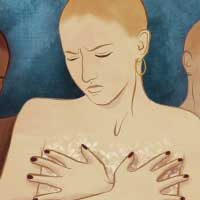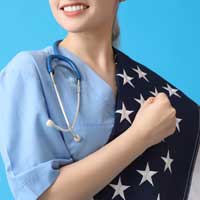Vickie W. Watts - My Personal Journey with Breast Cancer
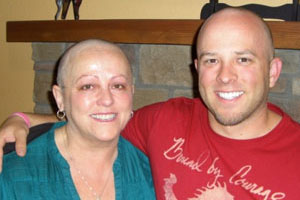
I was diagnosed with breast cancer (Stage II Invasive Lobular Carcinoma) on April 9th, 2009. One can be around cancer, have friends, even family, that are diagnosed, but the paradigm shifts completely when the doctor points at you and says, "You, you are the one who has cancer."
As much as we thought we understood cancer, it was then I realized my comprehension of cancer was always from a safe perspective. I say this from experience as both my mother and father died from cancer. I was there for much of their care-taking and meetings with the doctors during chemotherapy and radiation sessions. The same week I was diagnosed with breast cancer, my puppy of 13 years was diagnosed with bladder cancer. We lost her while I was undergoing treatment. In this testimonial, I will talk about the plan of action I took to fight my cancer. It is always a personal journey and mine was one with unexpected turns, many of which were critical in the outcome of my survival.
We all react to cancer in our own way and often it's an evolving process. My background is in forensic toxicology and I have worked in forensics and crime laboratories for over 30 years. Having a science-based background, I chose to respond with extensive research. If there is one take-home message I can give you from this testimonial, it is to urge the importance of being your own healthcare advocate. Knowledge is truly empowering. The more I understood about my cancer, the more I felt in control of my own destiny. You must embrace the disease and treatments completely and make critical lifestyle changes to prevent a recurrence of the same cancer or another cancer. Here are some guidelines:
- Organize all of your medical records. Request copies of reports whenever tests are performed.
- Take your medical records with you to all doctor's appointments, hospitals and clinics.
- Ask questions, seek more options, more answers, more treatment plans.
- Discuss, investigate and evaluate all treatment plans with your doctors.
- Be in control of your treatment as to what happens to your body.
- Make critical lifestyle changes both NOW to fight the cancer and LONGTERM to keep it from coming back. Nutrition is KEY to your outcome.
- Continuity of care is important. Cancer is not a one-time occurrence. The conversion of normal cells to abnormal cancer cells actually occurs multiple times daily in the body. The key is to maintain a healthy immune system to combat all viruses, bacteria, yeast and environmental toxins that assault us in every day life to never allow the cancer cells to grow.
- Read and study books and journal articles on fighting cancer with nutrition. Nutrition is critical to both fighting the cancer now and the long-term survival.
- Evaluate traditional medicine versus alternative medical techniques, listening to lots of opinions, getting multiple doctors second, third and even fourth opinions.
- I struggled with a wide variety of medical options such as surgery, chemotherapy and radiation in conjunction with immune boosting therapies, nutritional support and naturopathic chemotherapy.
- Ultimately, it was a combination of traditional, nutritional and naturopathic treatments that saved me from the body-ravaging medical treatments I was observing firsthand in other individuals who were receiving chemotherapy at the same time.
I employed my knowledge of biochemistry to study nutritional therapies for support and stimulation of the immune system support and developed an evolving, varying regime of supplements. Coming from a hard science background the study and practice of mind-body medicine was foreign to me, but I learned meditation and visual imagery techniques and practiced them daily. I did all this in conjunction with traditional allopathic (regular medicine) treatments.
I read and studied the controversy on the interaction of antioxidants with the chemotherapy drugs they were recommending for treatment. I finally found a few authors, both science-based and mind-body based, that suited me. And just like I cobbled my own hybrid health plan, I cobbled together my own mental health coping mechanisms. Doing all of this gave me a sense of control of my destiny and of my body.

Nutrition is of utmost importance. I read many books and journals on nutrition and cancer but have found two that I studied and referred to as reference books. One is "Beating Cancer with Nutrition" by Patrick Quillin, PhD. who managed the nutrition for Cancer Center of America for 18 years, and the second is "The Stupid Diet" by Dr. Dino Prato, ND, who founded and managed the Envita Medical Centers where I received most of my treatments for the past ten months.
After being diagnosed, I changed my diet completely. I had been a diet soda and sugar junkie, living a high-stress lifestyle and thinking that eating healthy was a protein shake in the morning and grabbing a zone bar on the go. After April 9th, I changed my diet completely to only organic fruits and vegetables, with limited meat in my diet allowing only organic free-range chicken and buffalo, no pork and no fish (due to an allergy). I stopped drinking both soda and alcohol and have been caffeine-free for almost 10 months now. The transformation for me was an easy choice, as I wanted to fight the cancer and repair my trashed immune system. I used the rule of 2's system from Dr. Prato focusing first on 2 weeks, then 2 months and now working on a lifestyle change by 2 years.
I was treated with integrative medicine at the Envita Medical Clinic for the past ten months. So much good came from that place, both to those of us that survived and those that didn't. We all felt blessed by one another. My experience with other cancer patients at Envita gave me an entire different perspective on my own disease. I was able to move beyond the present and focus on the long-term survival from the disease versus the immediate medical procedures I was undergoing such as the mastectomy.
My first exposure to the clinic was being placed in a room of uplifting individuals, many who were stage IV or end-stage cancer patients. Most all had come to the integrative clinic after their cancer came back at two or five years as the metastasis disease was now in their lungs, bones or brain. The energy in the room was magnetic as the individuals accepted me into their support group and encouraged me every day. I will always remember being told by one special individual who is no longer with us, "Vickie, you are going to survive because you came here first."
I came to realize how important the choices that I would make in how I would be treated now would affect my long-term survival. These are not thoughts that I would have focused on. My focus completely shifted from the fear of the original breast cancer to a broader understanding that being in early stage cancer placed me "in the driver seat" now, but if the cancer came back everything would change. This gave me the courage and drive to evaluate the medical procedures the doctors were recommending with a different point of view. Focus on fighting the cancer yet always be aware of maintaining my immune system's ability to continue to fight the cancer cells that already were in my blood stream or would be released into my bloodstream post-surgery when the tumor was removed.
My experience at Envita was healing in and of itself, in light of the fact that I arrived at Envita extremely ill with pneumonia and what they thought was valley fever. My surgery for the breast cancer had to be canceled three times and I had been in the hospital on IV antibiotics for a week and on oral antibiotics and Prednisone for almost a month with little improvement. The combination of cancer and pneumonia and valley fever was too much for my impaired immune system and I was not improving.
I wanted to beat the breast cancer, but I was not healthy enough to begin the fight. They rolled me into the clinic wearing a medical mask, on oxygen and running a 104 fever. After six weeks of naturopathic treatments at Envita I sailed through the breast surgery. I need to comment that after only two weeks of treatments at Envita I was able to be off the oxygen and my deep rasping coughs were gone. The fever had diminished and my energy levels were returning.
At four weeks I was dancing into the clinic each day. All my color was back and I was finally ready to schedule the surgery and get started with my fight against cancer. At six weeks, on July 7, I sailed through surgery and my surgeon told me I healed from the surgery like a 20 year old. Of course, the surgeons were taking all the credit, but in fact it was entirely due to the nutritional changes I had made in my diet, the mind and body medicine I practiced daily, the regiment of supplements I followed religiously for six weeks and the ozone and vitamin treatments that I had received at the Envita clinic.
I just want to make a comment on choosing the surgeon and the type of surgery. In interviewing surgeons and oncologists I soon came to learn that the big debate among breast surgeons is conservation with lumpectomy as opposed to taking the whole breast in a mastectomy. The result of the mammograms and MRI was I had two primary tumors each about 1.2 to 1.5 cm and they were 1 cm apart. The total area from the mammogram was estimated about 4cm. My first thoughts were to go for the double mastectomies, get rid of the both. I don't need them and they are "trying to kill me."
The reaction to rush into surgery and to get all the cancer out of you is a common one I have found in talking with many other breast cancer patients. Once you know you have it, you want to get it out of you fast. My insight here is don't rush. Take your time to do all the testing necessary and pick the right surgeon, since breast cancer is surgical survival. The surgeon must find clean edges, remove and test the nodes until no more malignant cells are found. You do not want to cut corners here.
After the mastectomy the pathology results showed the actual tumor area was 6 cm and those two lobular carcinoma tumors were actually connected by threads, like they were communicating. The big surprise was that in addition to the invasive lobular carcinoma that had spread to two tumors, I had two additional cancers in that breast, a ductile in situ and an invasive ductile that were still too small to be picked up by either mammogram or MRI. Another insight that I came to learn was that it is not the tumor itself that poses the real problem. Tumors can be removed by surgery or cyber knife or radiation. It is the cancer cells that escape into the blood stream that are the real problem, and you want to be sure to go after them. If they find a home and start to grow, you end up with a much more serious and often fatal diagnosis.
Following surgery I chose to do both naturopathic and traditional chemotherapy. The reason was twofold really. I understood that the traditional medical protocols had the years of history to predict survival rates but with my severe asthmatic lungs I was not sure I could make it through the treatments. After all, what good is it to beat cancer to only die from pneumonia?
The traditional chemotherapy treatments they were prescribing were called the CT cocktail using TaxotereÒ, which can cause nerve damage and severe allergic reactions. The second drug CytoxinÒ kills rapidly dividing cells in your body such as cancer, but also many other tissues such as hair follicles and much of your GI tract. The naturopathic chemotherapy protocol would go after the cancer or pre-cancer cells combating all the pathways that cancer cells took to replicate and form tumors. It also was an immune modulator and would not attack any of my healthy body cells. I went through 8 weeks of naturopathic treatments right after surgery along with continuation of the nutritional supplements, ozone and high dose vitamin C therapies using an Envita protocol to boost my immune system. My energy levels were high and I felt on top of my game.
By the end of the naturopathic treatments I was feeling healthier than I had felt in the past five years and had not experienced any asthma attacks for almost four months. In fact, the change in diet and nutritional therapies had almost eliminated any allergic reaction to pollens, perfumes or allergens that used to trigger my asthma attacks.
I started the traditional chemotherapy treatments September 8th and the first round was a wake up call to both my oncologist and the pulmonologist. They pretreated me with all the steroid medications both orally and IV as well as IV benedryl for the allergic attack of TaxotereÒ. They had to stop the treatment at 15 minutes in as I was having chest pains, shortness of breath and severe allergic attack. They slowed the dose down and gave me more benedryl and steroids. I ended up going into the emergency room in a full asthma attack, wheezing in both lungs. After that episode I received my chemotherapy for the next 4 rounds in the hospital and would have to receive IV steroids prior to the chemotherapy drugs to keep my airways open. My protocol was to receive treatments every 21 days. I went through five months of chemotherapy treatments ending my last session on January 12th of this year. Throughout this period, I only ended up postponing treatment once due to pneumonia related to the damage to my lungs had to be delayed while they had me on prednisone and antibiotics.
My son is a second year medical student and turned out to be my biggest supporter and fan. After my first round of chemotherapy I had my head shaved at our family hairdresser. He had prearranged to know the exact time and had his head shaved at school by his classmates in support of my battle. The photos at top of the page show us in October 2008 at a forensic conference and then our "chrome domes" one year later in October 2009.
One chemotherapy session when I was having difficulty with the asthma he drove down from Flagstaff for just a few hours to see me in the hospital and returned that same night back (six hours roundtrip) at 4am to attend classes the next day. Even though he was immersed in medical school classes and clinic, each day there was a positive text or e-mail cheering me on. My support group was the other patients, doctors, and staff at the Envita clinic who I had become very close to. In fact one patient, Ann will be a life-long friend. We talk daily about our progress and routinely share new research protocols.
The concept of taking antioxidants while undergoing chemotherapy was a very hot topic among the oncologists. I was not only on high doses of antioxidants, I was receiving high doses of vitamin C along with other potent antioxidants such as glutathione all intravenously. After much study and evaluation on journal articles on use of antioxidants and under consult of the naturopath doctor Lise Alshuler who just had went through the same chemotherapy treatments.
Lise gave me the protocol she used on herself after being diagnosed with breast cancer and having a mastectomy. I would stop use of all antioxidants three days prior to receiving chemotherapy. This included all supplements and IV treatments. While in the hospital getting the chemotherapy drugs into my system and for the first two days after chemotherapy would only drink organic greens and wheat grass shakes. In additional to the Envita-Aushuler nutritional supplement protocol I would take L-Glutamine 10 grams in water three times a day for a total of 30 grams (yes, grams) and high doses of B6 (10,000 mg) three times a day to prevent the nerve damage from the TaxotereÒ. Dr. Aushuler's book, The Definitive Guide to Cancer was a text I found extremely useful and informative throughout the entire journey with cancer.
During my treatments there was so much that I felt I had little control over. Although I knew the chemotherapy sessions were for my benefit, they still felt invasive and ravaging. Thankfully, the nutritional support and naturopathic IV therapies would heal my body after each round of chemotherapy. I would go into the hospital on Tuesday for chemotherapy and be released on Wednesday, then go back into the clinic on Thursday and Friday for IV naturopathic treatments.
I would literally arrive at the clinic ashen grey, coughing and wheezing and by the end of the treatments, the color would come back into my face and I would be talking and laughing with others at Envita. This combination of traditional chemotherapy with immune system support through the Envita protocols resulted in a treatment combination that allowed me to fight cancer and stay alive during the battle. More than that my quality of life was good during the chemotherapy treatments. After the second round of chemotherapy, my son and I walked in the Susan G. Koman Race for the Cure on a team with my surgeon and 15 of his past breast cancer patients. I later found out that although he was treating other patients currently undergoing treatment, I was only one who had the energy to participate.
Despite the pain, the fear, the numerous hospitalizations and the massive expense, I grew as a person because of the experience. Amidst the not so pleasant (okay, really bad times) there are moments of grace and knowledge that emerged, and I saw this with myself and other patients I had close contact with as well. If you are reading this testimonial and you have been recently diagnosed with cancer, my prayer is that in the midst of your obvious challenges, that you are blessed with moments of grace that are of comfort to you, and experience your own shining moments.

